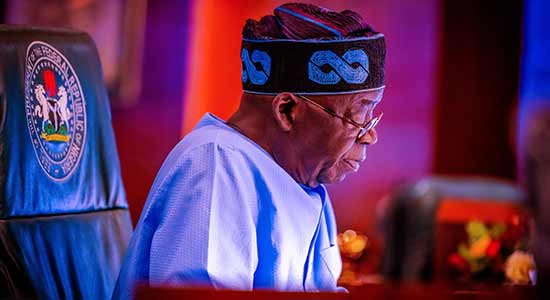Beyond the new Minimum Wage Act
It is quite a relief that Nigeria now has a new minimum wage of N70, 000 per month after a long-drawn battle and the assent to the bill by President Bola Tinubu. Significantly, the new law came with a provision that the minimum wage is subject to a review every three years in line with […]

president bola tinubu
It is quite a relief that Nigeria now has a new minimum wage of N70, 000 per month after a long-drawn battle and the assent to the bill by President Bola Tinubu. Significantly, the new law came with a provision that the minimum wage is subject to a review every three years in line with economic realities.
Now the issue has shifted to the employers of labour, especially the states, where some of them say they have a challenge meeting this amount. Before the agreement, only two states were known to be paying anything up to this minimum wage. Daily Trust hopes that reason would prevail to convince the governors and their advisers to accede to the amount already agreed upon.
Beyond this, it is pertinent to point out that a new wage rate, no matter how well decorated or eulogised, is not an end in itself. In other words, without complementary efforts by the government, the N70, 000 will on its own achieve little for the earners. The governments should, therefore, not see this as the end but rather come up with measures to make life easy for the vulnerable people.
We note that one characteristic of our national life is the virtual absence or collapse of public services. To a large extent, this is the root cause of the high rate of poverty in Nigeria, as reported by the National Bureau of Statistics two years ago. Nigerians provide virtually everything for themselves; from water to healthcare, power, roads, and other essential services. The new minimum wage will certainly not meet these needs.
- Each pilgrim was supported with N1.6m for 2024 Hajj – NAHCON chair
- Revenues: House of Reps c’ttee summons Dangote, BUA, INEC, 110 coys, agencies
Therefore, the government must of necessity provide those essential services such as healthcare, education and transport services to the citizens. Nigerians need a mass transit that can move the citizens from one place to another at affordable fares. This will help move our economy forward.
The government must also address the issue of the nation’s dilapidated healthcare system. Many Nigerians today, including those on a N70, 000 monthly wage rate, are being made to pay for healthcare from their pockets. Given the high cost of drugs and the diagnostic process, many Nigerians find it difficult to afford basic medical healthcare. Thus, a more effective health insurance scheme would assist in meeting the needs of the poor. In addition, more needs to be done in primary healthcare delivery for the rural populace.
Another critical area the government must address is the educational system. There is an urgent need for the nation’s public educational system to be made to work. Ordinarily, Nigerians do not need to send their children to private schools, but they are being forced to do so because the public schools have failed.
Without the rejuvenation of the public school system, the government would be inadvertently scheming the children of low-wage earners out of quality education that can guarantee a future for them.
Daily Trust also calls on all tiers of government to ensure adequate assistance is given to our farmers. This would ensure availability of food at affordable prices. Our farmers need fertiliser, seeds and other inputs to cultivate the land and get better yield. This would not only ensure food security but will help conserve our foreign exchange.
Thus, while we welcome and congratulate the federal and state governments, the labour unions and other stakeholders in reaching an agreement on a new minimum wage, we also call on those responsible to ensure its hitch-free implementation. We reiterate that the government’s primary duty is to ensure the well-being of its citizens. Given that the minimum wage would only affect a tiny fraction of Nigerians, it is pertinent for the authorities to redouble efforts in improving the welfare of Nigerians.
That is the surest way to prosperity for our dear nation.
